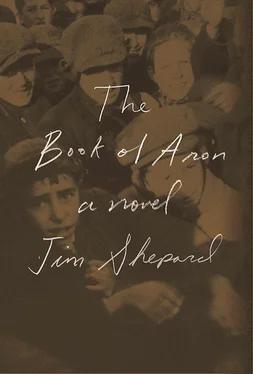I started back to the orphanage and two looters passed carrying a clothes wringer. On Twarda a German was poking a pile of clothes with a long stick and I hid and waited for him to leave. On Sienna the Ukrainians sat with their backs to the ghetto wall, tired and drinking with their shirts open. I got into the orphanage through the courtyard.
The kids were all in the middle of the upstairs room with the blackout paper still up on the windows. Everyone was together on the floor. Madame Stefa hugged me but Korczak stayed with his arms around Mietek and another little girl who was asleep. Madame Stefa told me to clean my face.
Some kids were whispering but most were listening. There was shouting and whistles and boots running by outside. Every so often someone got up to use the chamber pot.
We stayed like for that a day and a night. There was no dinner. No one lit any lamps. Once it got late Korczak stood up and weaved through the tangle of sleepers and lifted a corner of the blackout paper on one of the windows. He stood over Madame Stefa, who was asleep with her head back and mouth open, and raised a finger to his lips when he saw me looking. We watched each other until the sun came up and it was like the city outside was gone except for the occasional shot or voice calling in the darkness.
AFTER THAT KORCZAK WENT OUT EVERY DAY AND never let anyone else go with him. When he returned he told whoever wanted to listen what was happening as far as he could tell. The smallest kids held the hands of older ones, proud to have been included.
He said members of the Jewish Council had been arrested and their families held hostage. He said a proclamation had appeared announcing that all of the Jews would be resettled outside of Warsaw and only a few workers were to remain exempt and also that those who reported voluntarily would receive three kilos of bread and one of jam. He told Madame Stefa that only the Germans would have chosen to begin this on Tisha B’Av and when a kid asked why he explained that Tisha B’Av was a fast day commemorating Nebuchadnezzar the king of Babylon’s destruction of the First Temple and the Roman emperor Titus’s destruction of the Second. He said they were going block by block and doors that were locked or bolted were broken down and the streets emptied one day were being revisited on the next to catch those hiding in places already searched.
He told of how he’d saved an old student by pulling her from a Jewish policeman and shouting that he’d saved the policeman’s daughter that afternoon and so the policeman had let them go, but that he hadn’t saved the policeman’s daughter, not that the man could have ever known for sure.
He said he’d been thrown onto one of the roundup wagons and then a block later had been recognized by another yellow policeman who’d helped him down and warned him not to play the hero or it would get everyone killed. If they had to give up an arm or a leg to save the body, so be it. And if the Jews helped out, wouldn’t that mean fewer casualties and less brutality?
Was this how they were all supposed to ride off into the unknown, Madame Stefa asked, with no fresh clothes, no bundles, not even a piece of bread?
So many kids were crying that Korczak said the policeman had assured him that the orphanage was so famous that the Germans would never touch it. Everyone else was running about frantically trying to get work papers and men who’d been captains of industry were now overjoyed to sweep a factory yard and everybody said the brushmakers’ workshops were the best, because they were controlled by the Army, or that Többens’s workshop on Prosta Street was, because he was Göring’s brother-in law, so everyone wanted the green pass from Többens. But no one knew what worked and what didn’t and what seemed secure one day was a soap bubble the next. He said that while he’d been trapped on the wagon a German had told a woman whose papers featured all the proper seals and signatures that she was an imbecile and the best document that she could hope to find was a cellar.
AT NIGHT WE STAYED QUIET AND LISTENED FOR THE patrols. We could hear muffled sounds of people coming out of their hiding places for water and food. When someone cried or called out down below the windows we weren’t allowed to look.
Almost no one was sleeping. Korczak and Madame Stefa talked on the third floor when it was very late. Sometimes I listened from the stairs and sometimes I didn’t. Their voices were so low I couldn’t hear everything. He told her the shooting on Ogrodowa Street had gone on all day to accommodate those who hadn’t been at home earlier. She asked how he knew that and he asked how anyone knew anything. He said if people had survived they’d probably been hiding whenever something happened.
He said children had walked to the Umschlagplatz in order to travel with their families. The lucky ones left behind were stealing from empty homes since it couldn’t be stealing if there were no longer any owners. He said that the Ukrainians at the end of the day reminded him of farmers at the end of a harvest.
THE NEXT DAY HE CAME BACK SO UPSET HE WOULDN’T let anyone see him until Madame Stefa talked to him alone. Outside we heard the horns of police vans and whistles and the sound of people running.
He told her he’d gone all the way to the Umschlagplatz to find Esterka and got past the Ukrainians and Germans and Jewish police and found her and had tried to bring her to the hospital. At the gate he asked a blue policeman if he could help his assistant who was vital to his orphanage and the Pole said he knew very well that he couldn’t and while another Pole and a Jewish policeman dragged Esterka away Korczak stood there and let it happen and thanked the Pole for his kind words. This was what it had come to, Korczak said: he’d now been trained to be thankful for even that.
Kids tried to get by me on the stairs and asked what Korczak and Madame Stefa were talking about up there but I said I didn’t know. I couldn’t hear what else they said. Finally I heard him tell her they had responsibilities downstairs and to remember that if Miss Esterka didn’t return she’d assist others in the meantime, just as she had made herself so useful here.
THE NEXT MORNING A RUNNER FROM THE JUDENRAT told him about Czerniaków’s suicide. His secretary had found him dead in his office chair. Czerniaków had written notes to his wife and to the Judenrat. The runner showed the Judenrat note to Korczak, who read it and refolded it and handed it back, and the runner left.
When Madame Stefa heard they stood facing each other, their foreheads touching.
The rest of the morning other staff members gave what orders needed to be given. Korczak and Madame Stefa sat at the kitchen table over a single cold glass of tea. “The easy way out,” she finally said.
“He gave up a visa to Palestine to serve his community,” he answered.
Neither of them left the kitchen when Zygmuś told me there were two boys outside who wanted to see me and when I opened the front door a crack Boris pulled me out and another boy shut the door behind me. I was so scared I couldn’t hear what Boris was saying at first and finally the other boy slapped me and got my attention. He asked if I knew the interior of the Żelazna Street house, the one the Germans had set up, and asked me to describe its rooms and then seemed satisfied when I did. He asked how often I went there and at what times of day and whether the Germans guarded the doors. He said they needed me to let them know from the inside when it was a good time to pay a visit and I asked who they were and he said his group and when I asked who was in his group he told me it was none of my fucking business.
Boris still had me by the shirtfront and I said why should I do anything for them and Boris said because if I didn’t he would kill me and I said then he should just go ahead and kill me. They stared at me for a while until the other boy asked what I wanted and I had to think. Then I told him I wanted Korczak saved. And Madame Stefa too, if that’s what Korczak wanted. Boris snorted. The other boy thought about it and then said yes, he could arrange for this if I gave him what he wanted and that I’d be hearing from him soon. Then they left.
Читать дальше












